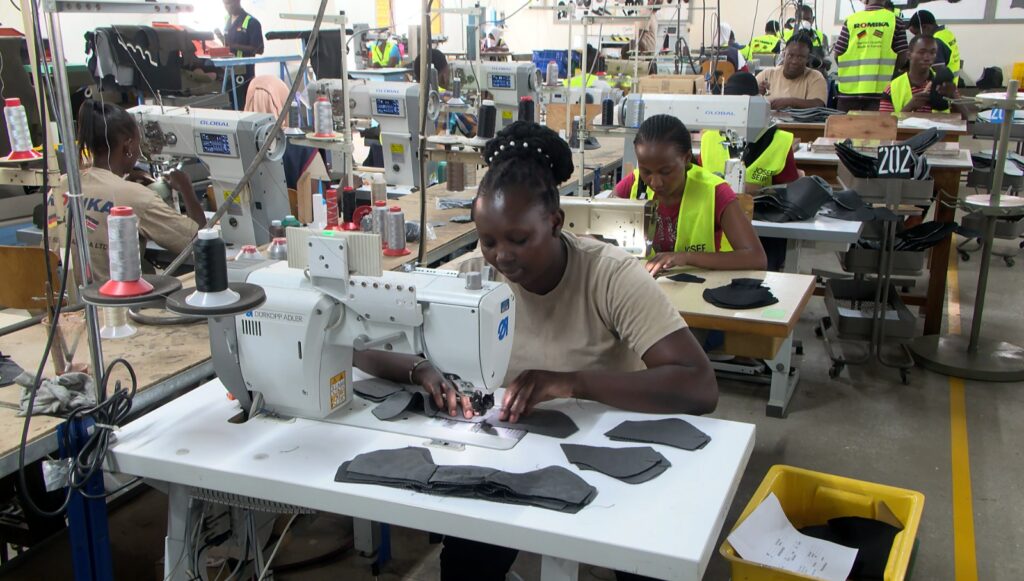By Hellen Awino
A section of youth in Kwale County have embraced technical and manual jobs in a bid to earn a decent living and avoid involvement in criminal gangs and drug abuse.
At Josef Seibel Africa LTD in Mvindeni, Msambweni Sub- County, ninety percent of the workforce is youth.
Josef Seibel is a shoe manufacturing company with a base in Germany.
The factory set foot in Mvindeni at the height of the Corona pandemic in 2020 that had engulfed the world leaving many destitute and without jobs.
Many unskilled young men and women got the opportunity to join the factory and get on-job training.
Most of those who got the chance had just lost jobs in the hotel industry which was facing tribulations during the pandemic.
According to the factory’s chief operations officer Tom Gichangi, a large number of the employees currently working there had zero experience in shoe making.
“The training that we offer to our new staff who have no experience in shoe making is skewed in a way that we will achieve our targeted global market” said Gichangi.
The factory is currently producing 500 pairs of shoes per day.
In line with the government’s policy of certifying unskilled workers in the jua kali sector through the Recognition of Prior Learning (RPL) program, the factory is also giving certification to its staff.
The program is regulated by the National Industrial Training Authority (NITA).
“We are the first shoe making company in Kenya to enroll our staff in the program. We already have ten workers who have received the RPL certification” Gichangi added.
Mwanamkuu Juma is in the skiving section of the factory.
She has a certificate in mechanical engineering but had not acquired any skill in shoe making before joining the factory.
During the corona pandemic, she says, she was among those whose businesses were affected.
“Since I was at home doing nothing, I applied for the vacancy when the factory started. I was lucky to get the chance” she notes.
Once new unskilled staff join the factory, they are undertaken through the training for a period between two weeks to two months.
“Before I joined here, I had no idea how shoes are made. From the training, I now know the shoes are manufactured from the setting stage up to the finishing stage” Said Mwanamkuu.
We met another staff member, Mohammed Gaatu, who joined the factory in October 2022.
Like all other workers, Gaatu had no experience in shoe manufacturing.
He says after the on-job training he can confidently do ninety nine percent of the duties he is assigned.
“I just used to wear many types of shoes but I knew nothing about how they are made. When I came here it was hard at first but with the training I have acquired I am able to do all the work I have been allocated” he said.
Being engaged in such jobs, Gaatu says will solve many challenges that face young people in the streets.
“It is not a must that you attain high education. Even if you don’t become a professor, do not despise a job like this. It will help you earn a good living without involving yourself in immoral activities” added Gaatu.
The Mvindeni factory has a workforce of 120 workers
“Jua kali sector has many opportunities for the youth and we have to embrace the technical courses” said Mwanasiti Kassim.
To feed the shoe market in the country, Josef Seibel has continued to open outlets for the ROMIKA and Josef Seibel shoe brands.
The latest shop was opened in Nairob’s Windsor House.
“We are bringing to the Kenyan market the same quality, fitting and designs as we have elsewhere in the world. Nairobi is where most middle- and upper-class populations live and where we also have big multinational organizations including the UN headquarters,” said Josef Siebel Africa, Chairman, Carl-August Seibel during the opening of the Nairobi shop.
He said that they want to show that good quality shoes can be made and sold in Kenya.
“The shoes we are doing here are distributed to at least 20 countries in the US, Europe and Canada. You can be proud as Kenyans that this is possible in a short time.” He noted.
German Ambassador to Kenya, Sebastian Groth termed the investment another big step for Germany and Kenya and adds to the total 120 German companies in the country.
“Germany will in the future look more and more interested towards Africa and Kenya especially in regards to investment and economic relations. We are ready to open a new chapter in our relations this year to mark our 60th anniversary of Kenya-German relations,” said Groth.
Eighty percent of the raw materials used in the factory are sourced locally.


